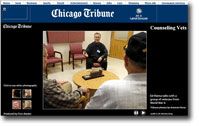The Oregonian Continues Its Excellent PTSD Coverage
 Hot on the heels of its massive PTSD series on the 3rd anniversary of the start of the Iraq War, The Oregonian delivers more stats and important information to its readership on combat-related posttraumatic stress disorder.
Hot on the heels of its massive PTSD series on the 3rd anniversary of the start of the Iraq War, The Oregonian delivers more stats and important information to its readership on combat-related posttraumatic stress disorder.
Click on 'Article Link' below tags for more...
From the Oregonian:Ron Cannon lost his right leg in a Vietnam minefield. Thirty-six years later, Luke Wilson lost his left leg in a rocket-propelled grenade attack in Iraq. They came together Monday in Salem with nearly 50 experts to say that while support for returning soldiers is broad, more must be done for Oregon's returning veterans.
Post-traumatic stress disorder is a top concern, along with high unemployment, underemployment and alcohol abuse, despite an unprecedented effort to reach returning vets and their families.
Although the President's 2007 VA budget calls for a 12.2% increase in funding, it still may fall far short of what's necessary to meet the need of our returning veterans.[A]t the Oregon Veterans Summit hosted by the Oregon Army National Guard in Salem, Congresswoman Darlene Hooley, D-Ore., said that the $339 million increase in mental health spending in that proposal still won't be enough to serve the needs of new combat veterans and those who served in previous wars. "The Oregon Army National Guard has lost enough soldiers," she said. "I don't want to lose any more when they come home."
Hooley told a packed room at the Guard's readiness center that the story in The Sunday Oregonian about Sgt. Bill Stout and his family's struggle with his post-traumatic stress "perfectly embodies why we're here, why we have to focus significant resources on reintegration and give veterans the help they need."
Staff members at the Portland Veterans Affairs Medical Center and at the Oregon Army National Guard reintegration team pointed to increasing evidence that returning veterans face immediate medical and mental problems.
Among the statistics:
Nationally, one-third of veterans from Iraq and Afghanistan have sought mental health care, many of them for PTSD, drug abuse, depression and alcohol abuse.
At the Portland VA Medical Center, one-fourth of the 775 veterans of Iraq and Afghanistan treated have sought mental health care. Of those, 62 percent screened positive for PTSD and 52 percent for depression.
Roadside bombs have produced more than 430 cases of traumatic brain injury among U.S. soldiers, and many more soldiers who survived concussions in such attacks have suffered cognitive and emotional problems. ...
Sgt. Phillip Jacques, a member of the Guard reintegration team who has dealt with job, mental health and medical care problems for fellow veterans since he returned wounded from Iraq, reminded all of the war's cost. His team has intervened in at least four potentially life-threatening crises involving recently returned soldiers. "PTSD is a big ugly animal. It hits the guys you'd never expect, the real hard chargers," he said. "But for the most part, it's hit everyone."
Thank The Oregonian and/or reporter Julie Sullivan for continuing their important work to educate their local communities on PTSD. They're showing other media outlets how it should be done.


 Are you a returning veteran coping with PTSD (or a military family member seeking help in supporting your troop with PTSD)? Getting answers to your questions can leave you stumped. Where can you turn? A good start is by looking at
Are you a returning veteran coping with PTSD (or a military family member seeking help in supporting your troop with PTSD)? Getting answers to your questions can leave you stumped. Where can you turn? A good start is by looking at 


 This weekend, as we remember the continuing sacrifices of our soldiers, sailors, airmen, and Marines involved in Iraq, I'd like to share a poem recently sent in by Chris Woolnough. You'll find her ode to our fighting men and women, a link to the writer's online bulletin board, and links to more poetry shared at PTSD Combat. Please send or post in comments any poems you'd like to share as well. And thank you, soldier.
This weekend, as we remember the continuing sacrifices of our soldiers, sailors, airmen, and Marines involved in Iraq, I'd like to share a poem recently sent in by Chris Woolnough. You'll find her ode to our fighting men and women, a link to the writer's online bulletin board, and links to more poetry shared at PTSD Combat. Please send or post in comments any poems you'd like to share as well. And thank you, soldier.


